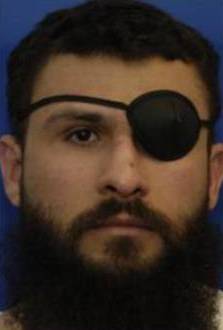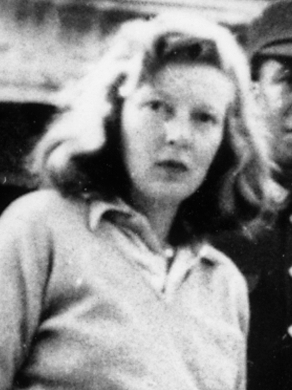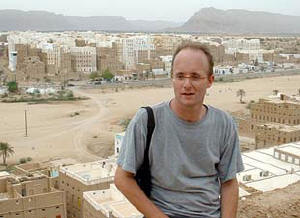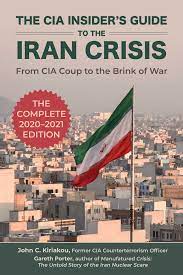
Abu Zubaydah is a Palestinian citizen born in Saudi Arabia currently held by the U.S. in the Guantanamo Bay detention camp in Cuba. He is held under the authority of Authorization for Use of Military Force Against Terrorists (AUMF).

Mohammad Mosaddegh was an Iranian politician, author, and lawyer who served as the 30th Prime Minister of Iran from 1951 to 1953, elected by the 16th Majlis. He was a member of the Iranian parliament from 1923, and served through a contentious 1952 election into the 17th Iranian Majlis, until his government was overthrown in the 1953 Iran coup aided by the intelligence agencies of the United Kingdom (MI6) and the United States (CIA), led by Kermit Roosevelt Jr. His National Front was suppressed from the 1954 election.

The 1953 Iranian coup d'état, known in Iran as the 28 Mordad coup d'état, was the U.S.- and British-instigated, Iranian army-led overthrow of the democratically elected Prime Minister Mohammad Mosaddegh in favor of strengthening the autocratic rule of the shah, Mohammad Reza Pahlavi, on 19 August 1953, with the objectives being to protect British oil interests in Iran after its government refused to concede to western oil demands. It was instigated by the United States and the United Kingdom. This began a period of dissolution for Iranian democracy and society whose effects on civil rights are prevalent to this day.

Martha Ellis Gellhorn was an American novelist, travel writer, and journalist who is considered one of the great war correspondents of the 20th century. She reported on virtually every major world conflict that took place during her 60-year career.

The Institute for Policy Studies (IPS) is an American progressive think tank, formed in 1963 and based in Washington, D.C. It was directed by John Cavanagh from 1998 to 2021. In 2021, Tope Folarin assumed the position of executive director. IPS focuses on US foreign policy, domestic policy, human rights, international economics, and national security.

Waterboarding is a form of torture in which water is poured over a cloth covering the face and breathing passages of an immobilized captive, causing the person to experience the sensation of drowning. In the most common method of waterboarding, the captive's face is covered with cloth or some other thin material and immobilized on their back at an incline of 10 to 20 degrees. Torturers pour water onto the face over the breathing passages, causing an almost immediate gag reflex and creating a drowning sensation for the captive. Normally, water is poured intermittently to prevent death; however, if the water is poured uninterruptedly it will lead to death by asphyxia. Waterboarding can cause extreme pain, damage to lungs, brain damage from oxygen deprivation, other physical injuries including broken bones due to struggling against restraints, and lasting psychological damage. Adverse physical effects can last for months, and psychological effects for years. The term "water board torture" appeared in press reports as early as 1976.
Robert Earle Parry was an American investigative journalist. He was known for his role in covering the Iran–Contra affair for the Associated Press (AP) and Newsweek, including breaking the Psychological Operations in Guerrilla Warfare and the CIA involvement in Contra cocaine trafficking in the U.S. scandal in 1985.

Gareth Porter is an American historian, investigative journalist, author and policy analyst specializing in U.S. national security issues. He was an anti-war activist during the Vietnam War and has written about the potential for peaceful conflict resolution in Southeast Asia and the Middle East. In the late 1970s Porter was a defender of the Khmer Rouge (KR) against charges that the KR was pursuing genocidal policies against the Cambodian people. Porter's books include Perils of Dominance: Imbalance of Power and the Road to War in Vietnam (2005), his explanation of the United States involvement in the Vietnam War.
"Enhanced interrogation techniques" or "enhanced interrogation" was a program of systematic torture of detainees by the Central Intelligence Agency (CIA), the Defense Intelligence Agency (DIA) and various components of the U.S. Armed Forces at remote sites around the world—including Abu Ghraib, Bagram, Bucharest, and Guantanamo Bay—authorized by officials of the George W. Bush administration. Methods used included beating, binding in contorted stress positions, hooding, subjection to deafening noise, sleep disruption, sleep deprivation to the point of hallucination, deprivation of food, drink, and medical care for wounds, as well as waterboarding, walling, sexual humiliation, rape, sexual assault, subjection to extreme heat or extreme cold, and confinement in small coffin-like boxes. A Guantanamo inmate's drawings of some of these tortures, to which he himself was subjected, were published in The New York Times. Some of these techniques fall under the category known as "white room torture". Several detainees endured medically unnecessary "rectal rehydration", "rectal fluid resuscitation", and "rectal feeding". In addition to brutalizing detainees, there were threats to their families such as threats to harm children, and threats to sexually abuse or to cut the throat of detainees' mothers.

John Chris Kiriakou is an American author, journalist and former intelligence officer. Kiriakou is a columnist with Reader Supported News and co-host of Political Misfits on Sputnik Radio.
The Martha Gellhorn Prize for Journalism, named for the war correspondent, Martha Gellhorn, was established in 1999 by the Martha Gellhorn Trust. The Trust is a UK-registered charity. The award is founded on the following principles:
The award will be for the kind of reporting that distinguished Martha: in her own words "the view from the ground". This is essentially a human story that penetrates the established version of events and illuminates an urgent issue buried by prevailing fashions of what makes news. We would expect the winner to tell an unpalatable truth, validated by powerful facts, that exposes establishment conduct and its propaganda, or "official drivel", as Martha called it. The subjects can be based in this country or abroad.
The Central Intelligence Agency (CIA) has repeatedly intervened in the internal affairs of Iran, from the Mosaddegh coup of 1953 to the present day. The CIA is said to have collaborated with the last Shah, Mohammad Reza Pahlavi. Its personnel may have been involved in the Iran-Contra affair of the 1980s. More recently in 2007-8 CIA operatives were claimed to be supporting the Sunni terrorist group Jundallah against Iran, but these claims were refuted by a later investigation.
Deuce Martinez is an American intelligence professional. "Deuce" is not his given first name, but a nickname that was used in the first newspaper article naming him. He was involved at the start of the Central Intelligence Agency's Rendition, Detention and Interrogation program of "high-value detainees," including Abu Zubaydah, Ramzi bin al-Shibh, Abd al-Rahim al-Nashiri, and Khalid Sheikh Mohammed.

Nicholas Davies is a British investigative journalist, writer, and documentary maker.

Scott Shane is an American journalist and author, employed by The New York Times until 2023, reporting principally about the United States intelligence community. In 2023, his nonfiction book Flee North: A Forgotten Hero and the Fight for Freedom in Slavery's Borderland was published by Celadon Books.

Jonathan Cook, born circa 1965, is a British writer and a freelance journalist formerly based in Nazareth, Israel, who writes about the Israeli–Palestinian conflict. He writes a regular column for The National of Abu Dhabi and Middle East Eye.
Kennett Farrar Potter Love was an American journalist for The New York Times.
Ian Cobain is a British journalist. Cobain is best known for his investigative journalism into human rights abuses committed by the British government post-9/11, the secrecy surrounding the British state and the legacy of the Northern Ireland's Troubles.
Iona Craig is a British-Irish freelance journalist. Since 2010 her reporting has focused on Yemen and the Arabian Peninsula.

Manufactured Crisis: The Untold Story of the Iran Nuclear Scare is a 2014 book authored by Gareth Porter, an American historian, investigative journalist, author and policy analyst specializing in U.S. national security policy. In this 310-page book, he asserts that Iran's nuclear energy program has been peaceful, arguing that the evidence widely cited to demonstrate Iran's nuclear weapons ambitions is fabricated by Israel and the United States.












